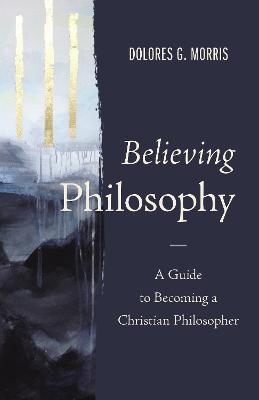Believing Philosophy: A Guide to Becoming a Christian Philosopher

Believing Philosophy: A Guide to Becoming a Christian Philosopher
Believing Philosophy introduces Christians to philosophy and the tools it provides believers, helping them understand, articulate, and defend their faith in an age of unbelief.
Philosophy has been a part of Christianity since its earliest days, and theistic philosophy predates Christianity by thousands of years. But Christians today often don't realize or are skeptical of all that philosophy can offer them.
In Part 1, author Dolores G. Morris explains why Christians should read and study philosophy. She begins with a historical overview of Christian philosophy from the church fathers to contemporary philosophers and then introduces the basic resources of philosophical reasoning: the role and aim of reason, distinctions between truth and reason and provability, and learning to read like a philosopher. These chapters address three foundational questions:
- What is philosophy?
- Why should a Christian study philosophy?
- How should a Christian study philosophy?
In Part 2, Morris introduces students to philosophical arguments and questions relevant to Christians. She presents arguments by three key branches of philosophy: metaphysics, epistemology, and practical philosophy. Building on concepts introduced in Part 1, she explains what philosophical arguments are and how they ought to be evaluated from a philosophical and Christian perspective. The following chapters examine specific questions most pressing for Christians today:
- The problem of evil
- Rationality and faith
- Free will
- Skeptical theism
- The moral argument for the existence of God
- Reformed epistemology
Each chapter introduces the problem, explains Christian responses, discusses the strengths and weaknesses of each response, and leaves the final verdict to the reader. Finally, each chapter concludes with a list of recommended further readings.
PRP: 154.94 Lei
Acesta este Prețul Recomandat de Producător. Prețul de vânzare al produsului este afișat mai jos.
139.45Lei
139.45Lei
154.94 LeiLivrare in 2-4 saptamani
Descrierea produsului
Believing Philosophy introduces Christians to philosophy and the tools it provides believers, helping them understand, articulate, and defend their faith in an age of unbelief.
Philosophy has been a part of Christianity since its earliest days, and theistic philosophy predates Christianity by thousands of years. But Christians today often don't realize or are skeptical of all that philosophy can offer them.
In Part 1, author Dolores G. Morris explains why Christians should read and study philosophy. She begins with a historical overview of Christian philosophy from the church fathers to contemporary philosophers and then introduces the basic resources of philosophical reasoning: the role and aim of reason, distinctions between truth and reason and provability, and learning to read like a philosopher. These chapters address three foundational questions:
- What is philosophy?
- Why should a Christian study philosophy?
- How should a Christian study philosophy?
In Part 2, Morris introduces students to philosophical arguments and questions relevant to Christians. She presents arguments by three key branches of philosophy: metaphysics, epistemology, and practical philosophy. Building on concepts introduced in Part 1, she explains what philosophical arguments are and how they ought to be evaluated from a philosophical and Christian perspective. The following chapters examine specific questions most pressing for Christians today:
- The problem of evil
- Rationality and faith
- Free will
- Skeptical theism
- The moral argument for the existence of God
- Reformed epistemology
Each chapter introduces the problem, explains Christian responses, discusses the strengths and weaknesses of each response, and leaves the final verdict to the reader. Finally, each chapter concludes with a list of recommended further readings.
Detaliile produsului











